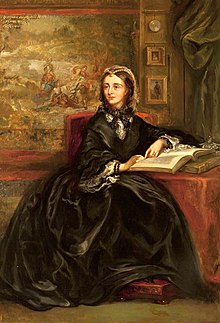Rebecca Dulcibella Orpen
Rebecca Dulcibella Orpen was born either in 1829 or 1830, the historical record is murky as to which, in County Cork, Ireland.
[1] Furthermore, her aunt's diaries suggest that Orpen was taught French by a governess in Paris and also knew German.
It has been suggested that Dering was actually intending to propose to Rebecca but, as a result of a misunderstanding, came to be engaged to Lady Georgiana, who was much older than him.
At the age of 37, on 18 July 1867, Rebecca Dulcibella Orpen married Marmion Edward Ferrers of Baddesley Clinton.
[3] Two years later, Lady Georgiana and her husband, Edward Heneage Dering, moved in with Rebecca and Marmion at Baddesley Clinton.
[5] The diary of John Henry Newman suggests that Edward Dering, Lady Georgiana, and Rebecca Orpen were received into the Church of Rome in 1865.
[1] Rebecca Orpen and Edward Dering, the surviving members of the foursome, remained together at Baddesley Clinton; however, because it was not socially acceptable for an unmarried man and woman to live together alone, a local priest came to stay with them for 13 months.
For example, she "steadfastly maintained what Country Life described as “the regime of mid-Victorian England modified by the wistful love of Elizabethan manners”[7] and she declined to have electricity installed in the house.
According to an account left by her last servant, "There was no electric light or lamps, only candles, rather trying in the winter, but we got used to it and managed quite well, but at times it was quite scary.
In a letter to Miss Mary Grafton from 1907, the year of the Mud March, Rebecca wrote "Don’t please encourage women[‘s] suffrage!
Instead, she seems to have regarded extending suffrage in the UK as impractical: "I drive to the Poll with a lot of rough people + force my way with the crowd.

